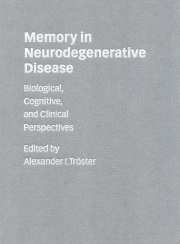Book contents
- Frontmatter
- Contents
- List of contributors
- Preface
- PART I Biological perspectives
- 1 Nonhuman primate models of memory dysfunction in neurodegenerative disease: contributions from comparative neuropsychology
- 2 Nonprimate animal models of motor and cognitive dysfunction associated with Huntington's disease
- 3 Neuropathology and memory dysfunction in neurodegenerative disease
- 4 Neurochemical aspects of memory dysfunction in neurodegenerative disease
- 5 Structural neuroimaging correlates of memory dysfunction in neurodegenerative disease
- 6 Functional neuroimaging correlates of memory dysfunction in neurodegenerative disease
- 7 The biology of neurodegenerative disease
- PART II Cognitive perspectives
- PART III Clinical perspectives
- Index
6 - Functional neuroimaging correlates of memory dysfunction in neurodegenerative disease
from PART I - Biological perspectives
Published online by Cambridge University Press: 23 November 2009
- Frontmatter
- Contents
- List of contributors
- Preface
- PART I Biological perspectives
- 1 Nonhuman primate models of memory dysfunction in neurodegenerative disease: contributions from comparative neuropsychology
- 2 Nonprimate animal models of motor and cognitive dysfunction associated with Huntington's disease
- 3 Neuropathology and memory dysfunction in neurodegenerative disease
- 4 Neurochemical aspects of memory dysfunction in neurodegenerative disease
- 5 Structural neuroimaging correlates of memory dysfunction in neurodegenerative disease
- 6 Functional neuroimaging correlates of memory dysfunction in neurodegenerative disease
- 7 The biology of neurodegenerative disease
- PART II Cognitive perspectives
- PART III Clinical perspectives
- Index
Summary
INTRODUCTION
Although this chapter is concerned primarily with memory, it is important to note that behavior and its relationship to the central nervous system are multifaceted and interactive. An effective understanding of neuropsychological dysfunction in one area carries the requirement that one also consider perception, sensation, motor performance, motivation, psychosocial factors and other aspects of behavior. In addition to the individual's personal history, five broad areas of neuropsychological functioning can be identified as important to consider in any study of brain and behavior – intelligence, cognition, sensory/motor function, affect (including coping or adaptation) and language (Berent 1990). These functional areas are interactive as well as independent. While good science necessitates reduction and simplification in order to account for intervening and experimental variables, it is also important to bear in mind that an organism of interest is the product of multiple internal and external forces and that behavior is multiply determined as a result.
Memory
The concept of memory, itself, is not unitary. Modern science has produced a complex categorization of memory that includes such classes as declarative (an image or proposition), its episodic and semantic subtypes, and procedural (e.g. implicit memory and skill learning) (Roskies 1994; Chapters 11 and 12). A well-established taxonomy of memory also divides memory into short- and long-term processes, and there is considerable literature that provides validating evidence for these conceptual distinctions (Martinez and Kesner 1986).
Information
- Type
- Chapter
- Information
- Memory in Neurodegenerative DiseaseBiological, Cognitive, and Clinical Perspectives, pp. 128 - 139Publisher: Cambridge University PressPrint publication year: 1998
